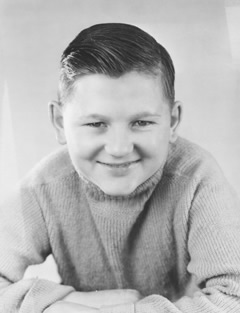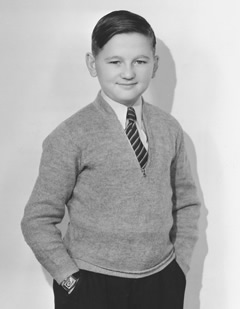SPOTLIGHT ARTICLE
ETERNAL YOUTH: WALTER TETLEY, RADIO'S ESSENTIAL KID
By Elizabeth McLeod
One of the constants of the radio era, from the early 1930’s to the mid-1950’s, was the crackling, sarcastic voice of a wise-guy kid. He might have been a delivery boy, a pestiferous nephew, or a force of pure adolescent evil, but the voice was always the same, issuing from the adenoids of one of radio's great character actors -- a man who spent his entire life trapped in an eternal boyhood. He was radio's greatest child impersonator, the extraordinary Walter Tetley.
 Walter Tetley wasn't an actual child at any point in his radio career, although he very effectively passed as one for a good bit of that time. Birthdates as recent as 1923 were used at various points in 1930’s publicity profiles about the performer, but in truth Walter Campbell Tetzlaff was born in New York in 1915. Of Scotch/German heritage, it was his Scottish dialect that would be the making of his career. As a true child performer in the 1920’s, young Walter developed an effective impersonation of Scottish comedian Harry Lauder. He was boosted by an endorsement by Lauder himself who, according to publicity, saw and enjoyed the impersonation immensely, and gave the boy's "Wee Harry Lauder" billing his personal blessing. Walter found his way into radio in the early 1930’s with his Scotch routine, appearing on such programs as the 1931 children's serial The Lady Next Door, Nila Mack's kiddie drama showcase Let's Pretend, and the long-running NBC Children's Hour, later known as Coast-to-Coast On A Bus, where he became a regular through much of the decade. In 1934, Tetley took a break from radio to tour England, where he was a music-hall sensation with his Lauder routine.
Walter Tetley wasn't an actual child at any point in his radio career, although he very effectively passed as one for a good bit of that time. Birthdates as recent as 1923 were used at various points in 1930’s publicity profiles about the performer, but in truth Walter Campbell Tetzlaff was born in New York in 1915. Of Scotch/German heritage, it was his Scottish dialect that would be the making of his career. As a true child performer in the 1920’s, young Walter developed an effective impersonation of Scottish comedian Harry Lauder. He was boosted by an endorsement by Lauder himself who, according to publicity, saw and enjoyed the impersonation immensely, and gave the boy's "Wee Harry Lauder" billing his personal blessing. Walter found his way into radio in the early 1930’s with his Scotch routine, appearing on such programs as the 1931 children's serial The Lady Next Door, Nila Mack's kiddie drama showcase Let's Pretend, and the long-running NBC Children's Hour, later known as Coast-to-Coast On A Bus, where he became a regular through much of the decade. In 1934, Tetley took a break from radio to tour England, where he was a music-hall sensation with his Lauder routine.
He returned from England a seasoned nineteen-year-old performer, and stepped into a job that proved the real making of his radio career: a two-year stint as one of Fred Allen's Mighty Allen Art Players. Joining the Allen company in 1935, Tetley developed the characterization that would carry him for the rest of his career -- a sarcastic pre-teen boy who suffered no fools and took no prisoners. Allen's lacerating scripts meshed perfectly with Tetley's wised-up voice and his impeccable sense of comic timing. Whenever the Mighty Allen Art Players needed a fresh kid to puncture a bloviating authority figure, Tetley was on the scene. His mouthy brats might speak with Jewish, British, Swedish, German, or Scottish dialects, but they were all brothers under the skin.
But amidst all this success, something unusual was going on with Walter Tetley. He was twenty years old, was approaching legal adulthood, and he still looked and sounded like a twelve-year-old boy. Something was preventing puberty from taking its full hold, and as the years went by, people wondered…and people whispered, and people speculated behind his back. But, Walter Tetley and his family never gave a full explanation for his condition. It just was. For better or worse, Walter Tetley would forever appear to be a wisecracking kid. His condition would be the making of his career…and of a crushingly lonely personal life. Because of his condition, he never felt free to be at ease with his radio colleagues, never felt that he fit in, and spent most of his free time alone. He rarely let a colleague into his private world, rarely expressed his feelings about his circumstances outside that private circle. What his associates knew about him, they knew from his work and little more.
In 1937, Tetley and his mother -- by all accounts a stern manager of her son's career -- moved to California, where the diminutive actor quickly found bit roles in a number of films. Unfortunately, movies didn't have much to offer, aside from endless roles as messenger boys, bellhops, elevator boys, and office boys. As he grew into his twenties, his face took on an odd pudginess, even though his body and his voice remained childlike. The combination was just visually unsettling enough to sour Tetley's chance of developing a more substantial movie career.
However, Tetley had arrived in Hollywood just in time for the movie capital's radio explosion. Major programs began moving westward in droves during the late thirties, offering Walter plenty of work. Directors soon found that actual child actors were unpredictable, unreliable, and frustrating to work with. Walter Tetley was a seasoned professional who never missed a cue, never fooled around during rehearsal, and understood his place in the cast. As a result, he worked steadily into the early 1940’s, a frequent performer on everything from obscure serials to the prestigious Lux Radio Theatre.
 In 1941, he landed the first of his two great radio roles -- Leroy Forrester, nephew of The Great Gildersleeve. Leroy was the all-American boy, 1940’s style, with a boy's problems and a boy's point of view. But, in common with Tetley's roles on the Fred Allen program, he was a boy who instantly saw through any display of phoniness…and took perverse delight in puncturing stuffed shirts. With Harold Peary's good-hearted-but-pompous characterization as his Uncle Throckmorton, Tetley found a perfect sparring partner. He would remain with the program -- outlasting even Peary himself -- for seventeen years. Leroy's character progressed very slowly over that span from a mischief-seeking preteen prone to throwing rocks through windows and fooling around by the vacant lot, to a fumbling high-school freshman, struggling with first dates and driving lessons. But, the voice and heart of the character remained consistent -- just like Tetley himself. In 1941, he landed the first of his two great radio roles -- Leroy Forrester, nephew of The Great Gildersleeve. Leroy was the all-American boy, 1940’s style, with a boy's problems and a boy's point of view. But, in common with Tetley's roles on the Fred Allen program, he was a boy who instantly saw through any display of phoniness…and took perverse delight in puncturing stuffed shirts. With Harold Peary's good-hearted-but-pompous characterization as his Uncle Throckmorton, Tetley found a perfect sparring partner. He would remain with the program -- outlasting even Peary himself -- for seventeen years. Leroy's character progressed very slowly over that span from a mischief-seeking preteen prone to throwing rocks through windows and fooling around by the vacant lot, to a fumbling high-school freshman, struggling with first dates and driving lessons. But, the voice and heart of the character remained consistent -- just like Tetley himself.
After the war, Tetley picked up a second major role. The writers of the Phil Harris-Alice Faye Show needed a worthy antagonist for happy-go-lucky Phil and his loutish sidekick Frankie Remley -- and Walter Tetley fit the bill perfectly. Cast as Julius Abbruzio, the neighborhood grocery boy, Tetley gave the program the extra ingredient it needed to become one of the most hilarious comedy programs radio would ever know.
The two roles show the breadth of Tetley's acting talent. Even though their voices were similar, with Julius betraying more of Tetley's New York origins than Leroy, the characterizations were quite different. Leroy, though he got into trouble, was basically a good kid, and you knew he'd grow up into a fine man one day. Julius, on the other hand, was nothing less than the Devil himself incarnated as a teenage boy. He took evil delight in tormenting Phil and Frankie, immediately sizing up their predicament of the week and devising a spur-of-the-moment scheme to make it exponentially worse. And, in his side comments to the lovely Alice Faye, Julius revealed a rather more-than-adolescent appreciation for the fleshly pleasures -- a trait that would have made poor Leroy run to his Uncle Mort for an uncomfortable explanation.
The postwar years were busy ones for Walter Tetley, with a leading role in a syndicated transcription show, The Anderson Family, alongside his network assignments. A few years later, he had a chance at his own network series, The Kid On The Corner, which would have featured Tetley as a wisecracking newsboy, with veteran announcer Harry Von Zell as his stack-blowing straight man. An audition recording circulated in 1948, but wasn't picked up. Leroy and Julius, however, would keep Tetley busy and working well into the 1950’s.
Tetley also dabbled in animation voices. As far back as 1936, he had been the voice of Felix the Cat in an ill-fated revival of that classic 1920’s character. In the 1940’s he worked frequently for the Walter Lantz studio as the voice of Andy Panda and other characters. And, when television arrived, he became a favorite at the Jay Ward studio, notably as "Sherman," the boy companion of time-traveling canine genius Mr. Peabody.
The late 1960’s were not kind to Walter Tetley. Radio was dead, animation voice work only went so far -- with endless reruns, the demand for new episodes dwindled every year -- and there wasn't much else on the horizon. He still kept his distance from colleagues, and still found it difficult to make friends. Perhaps to assert his adulthood after decades of being treated as a child in the workplace, he took up motorcycling -- only to suffer a crippling accident in 1971 that shattered a leg and left him in a wheelchair for the rest of his life. He struggled on, providing voices for commercials, TV specials, anyplace where he could find a spot to use his unique talents. In 1973, he even found a chance to work in radio again. Elliot Lewis -- Frankie Remley himself -- was busy with his new Hollywood Radio Theatre series and reached out to his old castmate, adding Tetley to his anthology's repertory company. It was a last hurrah for the eternal boy who'd finally had time catch up with him.
Walter Tetley died in 1975, of complications from stomach cancer, at the age of sixty. But, Leroy and Julius live on, among radio's most beloved characters, forever frozen in time.
Copyright 2012 Elizabeth McLeod and RSPT LLC. All rights reserved.
May not be reproduced without permission.
|